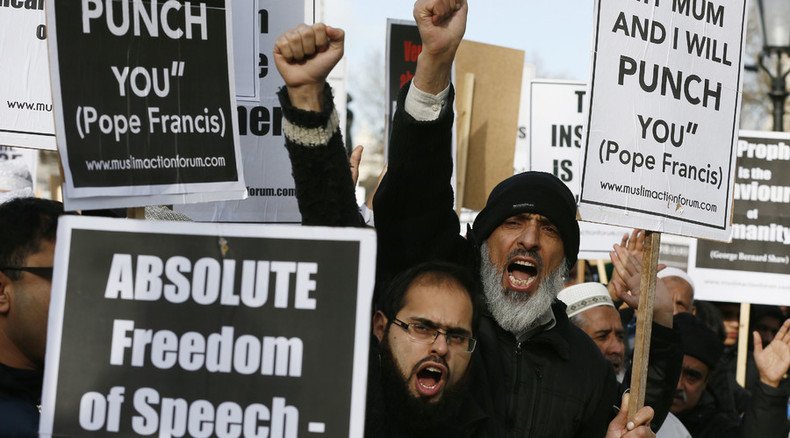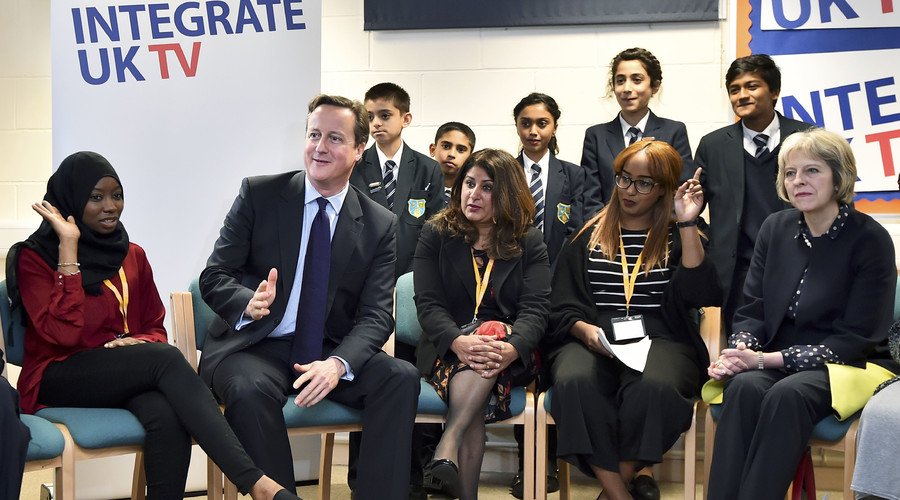‘Muslim voices strongest critics of ISIS’

Following the latest terrorist attacks Islamophobia in the EU might deteriorate, experts say. But we should not forget that ISIS has targeted huge numbers of Muslims and some of the strongest criticism of the terrorist group has come from Muslims.
READ MORE: Cameron’s response to ISIS: £2bn military boost, 2,000 new spies, double drone fleet
RT: Cameron mentioned drone warfare. The US has been using drones in Pakistan and Yemen, with limited success and numerous civilian casualties. Why would David Cameron think drones can defeat ISIL?
Simon Mabon: I think there is an argument to be made that drones are one of the easier forms of strikes to defend the British public in a sense that drones are not susceptible to human cost and that drones can’t be shot down with the loss of human lives. So in that regard that is seen as quite a neutral weapon for the British public, granted an inexpensive weapon in terms of British casualties. In terms of what happens on the ground in Iraq and Syria – that is a different story, hugely controversial with the number of civilian deaths that we’ve seen through the use of the US drone program; and also the questions about the legality as well.
RT: Is raising military spending likely to make any difference in countering Islamic State?
SM: I think there are a number of different factors that you’ve got to take into account here. Clearly there are legitimate military targets that should be addressed, and France started to do that in the past couple of days. But that is not the only issue at play here. There needs to be a much more concerted effort to challenge the group from below: rather than looking at the decapitation strategies that the US has been employing across Iraq and Afghanistan since 9/11, to look at different strategies - because every time the US is taking out a strike, it’s led to a sort of a hydra-type effect, where they take out one leader and this leads to more and more springing up. I fear that has happened with the emergence of ISIS born out of Al-Qaeda in Iraq morphing into this group that we’re seeing today. So we need to look at ways of countering the group on the ground taking away those people that are finding support in the group for all the reasons that aren’t necessarily just following the ideology of the group.
RT: The British prime minister also talked about defeating Islamic extremist ideology. Will Muslims in the UK feel under greater scrutiny?
SM: It is difficult to figure out how Muslims are going to react here. There has been a lot of criticism of the [UK] Prime Minister’s response by saying that it has been too draconian and as a consequence this will marginalize Muslim communities. But it is important to remember we’re not talking about the Muslim community as a whole – we’re talking about lots of different parts of it. And some of the strongest criticism against ISIS has been from Muslim voices. Let’s not forget that ISIS has targeted huge numbers of Muslims - both Sunni and Shia. So some of the strongest critics have been Muslim voices themselves. Figuring out the right balance of insuring British security, but also making sure that British Muslims aren’t been marginalized is a tricky thing to get right.

'Anti-Muslim hatred might increase'
According to the latest report by the Islamic Human Rights Commission, in 2014 one in five British Muslims experienced physical assault and two in three were verbally abused. IHRC said that majority of the Muslim population in the UK face negative stereotypes concerning their religion.
Arzu Merali, research director of the Islamic Human rights commission said “the level of anti-Muslim hatred now is much higher and the ability for random people to feel empowered to attack someone or to discriminate against them is now really much easier.“
RT: Do you think the situation in the UK and in the EU in general deteriorated even more after the recent attack in France?
Arzu Merali: Sadly every time there has been an incident like the one we’ve just seen in Paris, we’ve seen a spike in street level attacks. And what happens afterwards is obviously the level drops, but we feel it doesn’t drop back to the pre-event levels. And what you also get is an increase in unseen Islamophobia - things like discrimination at work, at school – subtle forms of Islamophobia, hearing offensive statements and so on, when you’re out and about that type of thing. Sadly that is something that we’ve been recording for a very long time.
Anti-Muslim hate crime to be treated as seriously as anti-Semitism – Cameron http://t.co/wthcNI7pVapic.twitter.com/S3chhOqe3A
— RT (@RT_com) October 14, 2015RT: Last month Cameron announced that anti-Muslim hate crimes would be recorded as a separate category and treated as seriously as anti-Semitic attacks. Do you see it as a significant step?
AM: Well, that recent change from the government in the law has only come about very recently, so it is hard to see at the moment whether there has been any real change. But as someone within an organization has been advocating for changes in the legal culture for nearly 20 years now, we have to say this has come rather late in the day. Maybe 20 years ago this would have been a significant tool in addressing Islamophobia. But what we feel is that the level of anti-Muslim hatred now is much higher, and the ability for random people to feel empowered to attack someone or to discriminate against them is now really much easier. This is kind of small change in the law is not by itself going to do anything. There has to cultural change.
RT: What are the possible consequences of the recent attacks in Paris? Do you think the attitude towards Muslims might change?
AM: I don’t want to make any doom and gloom predictions, but sadly we’ve seen such deterioration in the way Muslims are spoken about. They are sort of routinely described as enemies and somehow portrayed to be secretly hating, or actively or secretly violent against so-called state values, whatever that may be – that is a whole discussion itself – is what that might be.
You could be looking at legal regimes that incarcerate people on mass– this is something that we think we’ve seen before in Europe and we don’t know where we’re going in this direction. We already have laws that have a lower threshold of evidence when it comes to trying mainly Muslims on so-called terror charges. We’re already seeing a big change in the way the law treats Muslims. We feel and we fear that could get worse.
The statements, views and opinions expressed in this column are solely those of the author and do not necessarily represent those of RT.












